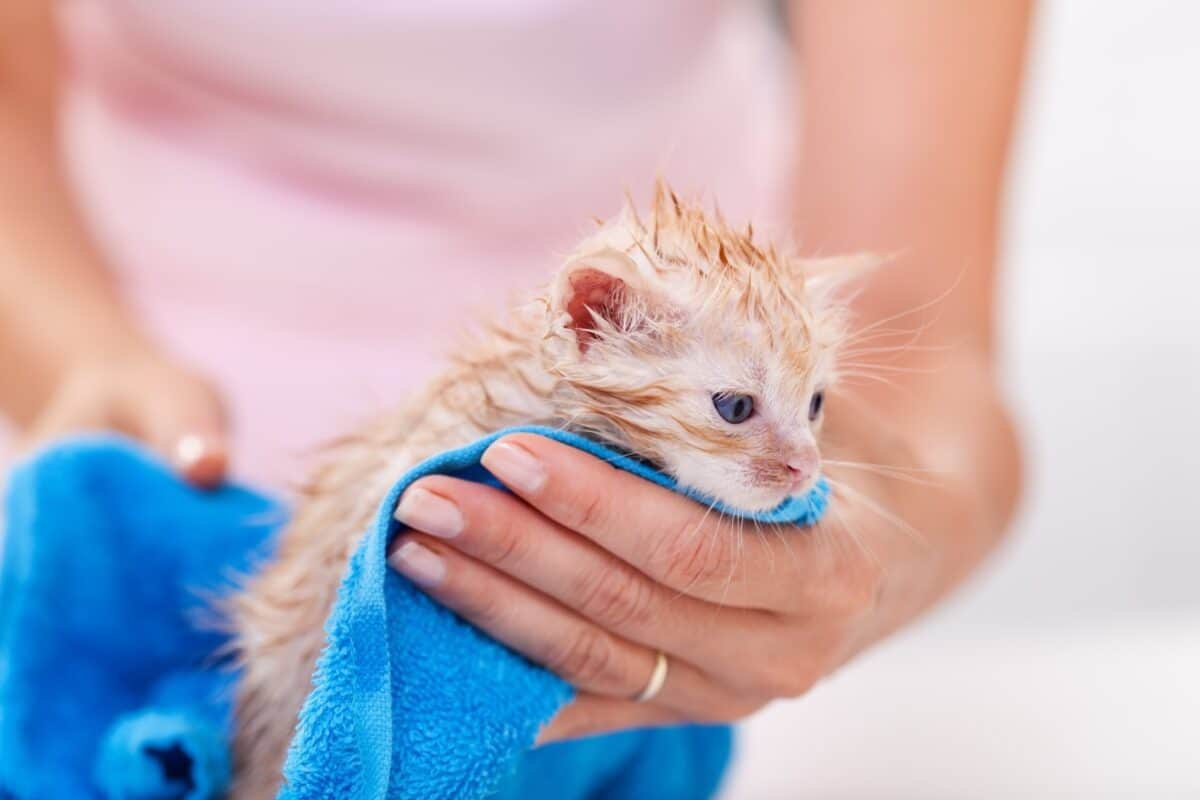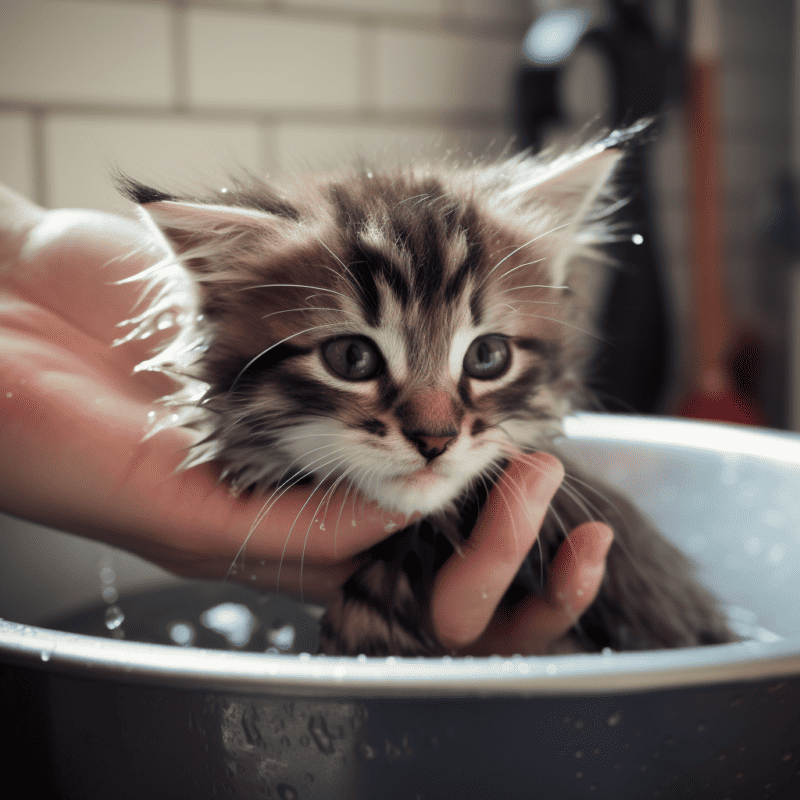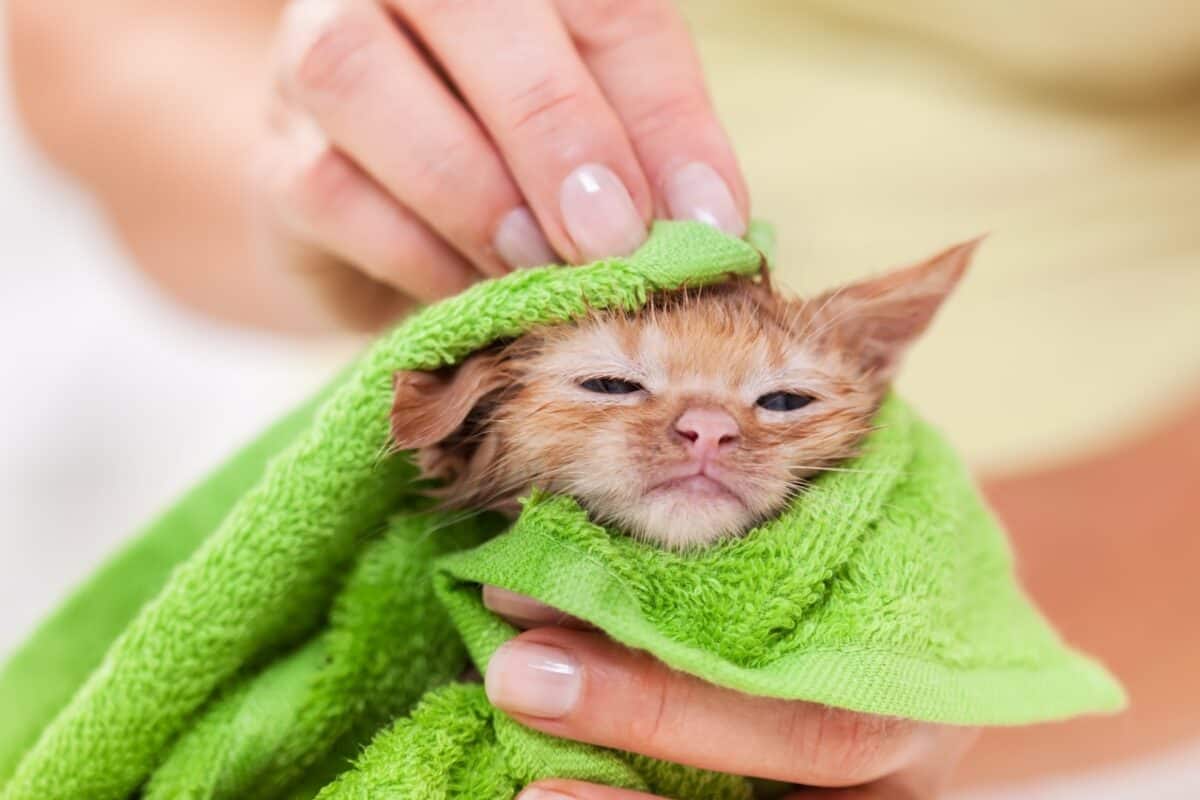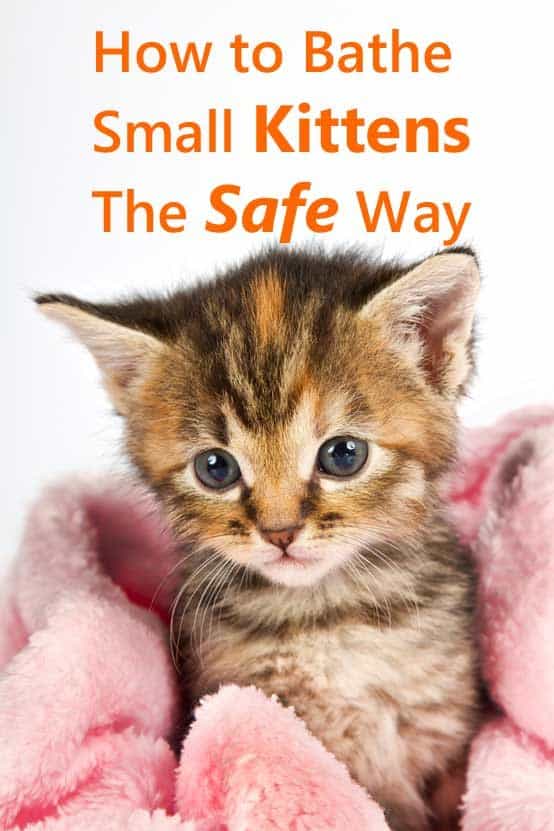You're home with a cute, fluff-ball of a kitten. Everything is picture-perfect until that tiny bundle of joy runs into a messy situation that leaves it all dirty.
Now you're left wondering, "To bathe or not to bathe?" Good question!
This article has got your back, folks!

Sure, kittens are tiny and delicate - think of a porcelain doll that purrs.
You might not realize it, but their little bodies are way different from ours or even from adult cats. They're more like half-baked cookies that need more time to fully prepare.
Their tiny size makes them more susceptible to environmental changes, and their immature systems are still working out the kinks, like regulating their body temperature.
We're going to break down the potential dangers of bathing kittens: hypothermia (that's a fancy word for getting too cold), scalding, and even dry skin. Yes, kittens can get dry skin too! Who knew, right?
But sometimes, you'll be stuck between a rock and a hard place.
Your little fluff might get fleas or get covered in something yucky, and suddenly a bath doesn't seem like such a bad idea anymore. Don't sweat. We've got you covered there too. You'll find some handy tips and tricks for bathing your kitten safely here.
We'll walk you through setting up a cozy bath space, choosing the right water temperature (there's a perfect range, trust us!), picking a kitten-friendly shampoo, and lots more.

So stick around, and let's sort out this kitten-bathing business together. After all, there's nothing quite like a clean, happy kitten to make your day, right?
SIGN UP FOR THECATSITE'S EMAIL UPDATES >
Should You Even Bathe Kittens?
The short answer is: No. Unless you have a very good reason to, do not bathe kittens.
Kittens are fragile little creatures. The younger they are, the more fragile they are.
Their small body size means they have a lot of skin relative to their mass, and that ratio makes them more sensitive to changes in their environment.
Also, some of their systems just haven't yet fully matured. Just like their eyes take three more weeks to develop, so do other parts of their body, including their immune system and the systems that control their body temperature.
What Are the Risks?
There are several risks associated with bathing kittens:
Hypothermia
Kittens cannot regulate their body temperature very well and are susceptible to getting chilled. A cold kitten cannot digest its food well, making it even harder for its tiny body to get the nutrients it needs to keep warm.
A chilled kitten can die very fast unless treated properly, making this a medical emergency. Call your vet immediately if you think you have a chilled kitten on your hands.
Water is often used for cooling off the body. Getting a kitten wet always puts it at risk of chilling, making this the number one risk associated with bathing kittens.
Scalding and overheating
A kitten's sensitive skin can get scalded very easily. Even if the temperature is not hot enough to cause a skin burn, you can still overheat the kitten's little body.
Dry Skin
Washing the kitten with water, especially water containing even mild soap or shampoo, can dry up the kitten's skin, sometimes to the point of creating a rash. The risk increases the more frequently you bathe the kitten.

When To Bathe A Kitten
There may be situations when bathing a kitten, even a very small one, is the lesser of two evils.
Such is the case with a flea infestation when you can't use topical anti-flea remedies because they are too toxic for kittens, a scenario rescuers often face when taking young kittens off the street.
If a kitten manages to become covered in a substance that needs to be removed, a bath may sometimes be the only solution as well.
Here are some guidelines and tips for bathing your kitten safely:
Preparing for the Kitten's Bath
Warm up the bathroom as well as the room where the kitten will stay after the bath. Make sure both rooms are draft-free.
Choosing the Perfect Bathing Spot
Use a sink or a very large bowl for the kitten's bath. Make sure you have enough room to work comfortably. You can place a folded towel in the middle of the sink, allowing the kitten a place to rest those feet and feel more stable.
Gathering Your Bath Time Materials
Prepare dry towels and warm them up a bit in advance. Use them to wrap up the kitten and gently yet thoroughly dry her/him after the bath.
Setting the Ideal Bath Water Temperature
Use a thermometer for the bath water and make sure the temperature is 101-103 degrees. Use a baby bath water thermometer that can float around and let you know if the water is cooling.
Choosing the Right Shampoo for Your Kitten
Use a gentle cat shampoo. Many rescuers use Dawn soap instead, and it seems to do the trick. Never use medicated shampoos or shampoos intended for humans or dogs!
How to Safely Wash a Kitten
Make sure to never wash the kittens' ears or eyes. To be on the safe side, it's best to avoid washing a kitten's head altogether. You can use a damp washcloth to wipe off any dirt from that area later on.
Bathing Multiple Kittens
Wash one kitten at a time and towel dry thoroughly before moving on to the next kitten. If the kittens are small enough, prepare confinement boxes where you can keep the kittens safe while they're waiting for their turn, or waiting for their siblings to be bathed.
After-Bath Care for Kittens
Remember to check the kittens after they are washed and dry. If a kitten feels cold and unresponsive, keep it warm and call your vet ASAP.
Must wash your cat? Try these gentle cat shampoos:
Magic Coat Cat Tearless Shampoo
Vet's Best No-Rinse Clean Waterless Cat Shampoo
Earthbath All Natural Pet Shampoo
It's possible to bathe kittens safely, as long as you're aware of the risks and do all you can to avoid them.
FAQs: Everything You've Wanted to Know About Bathing Kittens
1. How old should a kitten be before I can bathe it?
Oh, the big question! You know what? If at all possible, it's best to hold off on that first bath until your little fur baby is at least eight weeks old.
As we mentioned, their tiny bodies are still figuring things out before then, so it's safer to wait. Remember, patience is a virtue (especially when it comes to kittens and baths!).
2. Can I use human shampoo or dog shampoo on my kitten?
Please, don't! Kittens have super sensitive skin, and using human or dog shampoo can be too harsh and potentially harmful for them.
Stick with a gentle, kitten-friendly shampoo or a trusted soap like Dawn. Your kitten's skin will thank you!
3. How often should I bathe my kitten?
Unless they've rolled in something super gross, kittens do a pretty good job of keeping themselves clean. Aim for no more than once a month if you absolutely have to.
But always remember: less is more when it comes to kitten baths!
4. What should I do if my kitten is scared of water or resists bathing?
Well, who wouldn't be a bit nervous about their first bath? It's important to keep things calm and soothing.
Talk to your kitten in a gentle voice, make sure the water is lukewarm and isn't too deep, and never rush the process. With a bit of time and patience, your kitten might just start to relax!
5. What should I do if my kitten feels cold or looks unwell after a bath?
This is super important! If your kitten feels cold to the touch, wrap them in a warm towel straight away.
If they still seem unresponsive or unwell, call your vet ASAP. It's always better to be safe than sorry when it comes to your kitten's health!
And there you have it, folks - the top 5 questions about bathing kittens. Remember, we're in this together, navigating the choppy waters (pun intended) of kitten bathing!
SIGN UP FOR THECATSITE'S EMAIL UPDATES >
You might also like:
How To Train Kittens To Use The Litter Box
Weaning: How To Get Your Kittens To Eat On Their Own
Need to pin this? Here's an image you can use -

Note: We may get commissions for purchases made through links on this page.






29 comments on “7 Crucial Tips for Safely Bathing Small Kittens”